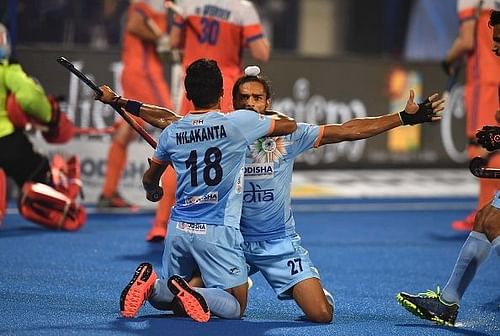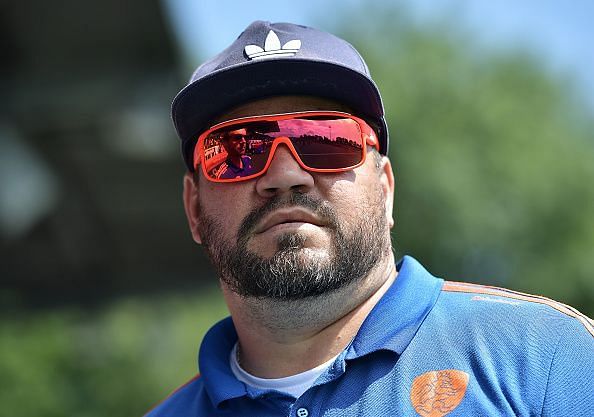
A vital year ahead for Indian hockey with Pro League plunge ahead of Olympics

The inaugural edition of FIH's elite Pro League came to a close in the Dutch city of Amsterdam in June, six months after Spain held World Champions Belgium to a draw at home in Valencia.
A series of thrilling home-and-away matches saw Australia, Belgium, Netherlands, and Great Britain qualify for a Grand Final - which also earned them a place in the Olympic qualifiers ahead of Argentina, Germany, Spain, and New Zealand.
All the eight Pro League teams have since made it to Tokyo 2020 - and will be in the fray one more time when the second edition begins in January next year.
India look to add Asian flavour to Hockey Pro League
Pakistan, the lone Asian torchbearer in the first chapter were suspended even before playing a match after expressing their inability to take part - while India - the world's fifth-ranked team declined the offer to join the world's top-ranked teams in the first-of-a-kind hockey event.
It is debatable as to whether the League missed India more or vice versa, but Hockey India's nod to participate in the second edition has given the tournament a distinctive new flavour.
The opener of the tournament's 2020 edition will feature the Indians who will be up against World Cup silver-medalists, the Netherlands - and coach Max Caldas who guided his side to a Pro League bronze earlier this year explained to Sportskeeda that in a tournament of this nature, it was essential to strike a balance between the desire to win and broaden the player base.
Never before has the hockey world witnessed a competition which involves shutting across continents in the space of a week or two with players having to stretch their physical and mental reserves to the maximum.
Rotating squad key to Pro League success
The going is not about to get any easier as the upcoming Pro League is slated to be held before the Tokyo Olympics which begin in late July, and when asked what teams needed to succeed in the event, Caldas was emphatic that it was essential to expose the fledgelings on to the big stage to add depth to the unit.
Healthy balance in your squad between playing to win with your best possible group, exposing young/new players to the highest possible level and determining how the HPL fits into an Olympic season.
Rotating the squad and managing the itinerary is the challenge says the coach who introduced a host of young Dutch talent this year.
So, when are the players having breaks, how long are those breaks, how do you prepare the up and coming players, having good scheduling (flights/hotels/time zones)in your trips.
How well-prepared are the Indians for a competition such as this after having joined the bandwagon a year late?

A team which began the year 2018 with a breath of fresh air thanks to some outstanding young talent like Vivek Sagar and Dilpreet Singh coming to the fore failed to finish on the podium at the Commonwealth Games at Gold Coast - but astonished the hockey world with a silver medal in the Champions Trophy finishing ahead of Argentina, Belgium, and the Netherlands.
Just when it seemed that a path to ascendancy was being charted out, a semifinal loss to Malaysia in the Asian Games laid bare the inconsistency in the ranks which a quarterfinal finish at the World Cup failed to make up for.
A loss to South Korea in the final of the Azlan Shah Cup early this year did little to add cheer and despite wins in the FIH Series Finals and Olympic qualifiers, the Indians can scarcely boast of having crossed swords triumphantly with the best in the business in what has been a relatively quiet 2019.
The Indians who all but upset the kookaburras in the Champions Trophy final at Breda last year looked distinctly circumspect - losing by heavy margins on tour to Australia in what was coach Graham Reid's first outing in May.
Manpreet Singh and co. had battled hard to earn a draw 2-2 draw against Belgium at Odisha 2018 but Reid was candid enough to point out that the Belgian outfit that the Indians beat ahead of the Olympic qualifiers was by no means a full-strength world champion side.
It has often been said that Asian teams like India and Pakistan are just as outrageously talented - as they are woefully erratic - a trait which the Indians will need to address if they are to justify their world rankings in a long-drawn and unsparing Pro League.
Are India and Pakistan more erratic as compared to the Europeans?
At the Olympic qualifiers, the much-awaited India-Pakistan clash failed to materialize as the two giants of world hockey were drawn to play Russia and the Netherlands respectively - but both teams confounded the pundits in contrasting styles.
While the Indians began as the overwhelming favourites against Russia, not many believed that Pakistan had it in them to challenge the third-best side in the world.
The once-mighty Men in Green showed flashes of brilliance at the Champions Trophy last year but failed to impress in the World Cup - and have not been seen on the international stage since.
Yet, Pakistan ranked a lowly 17th, silenced their detractors by very nearly pulling off a win against the mighty Dutch in the first leg of their qualifiers before Mink van der Weeden drew level for the home side in the very last minute.
Following the epic contest which ended 4-4, the global hockey fraternity tuned in to watch a potential humdinger in the second-leg, only to see a clueless Pakistani side blown away by a 1-6 margin - much to the disappointment of those who were hopeful of a possible resurrection for the three-time Olympic gold-medalists.
The Indians, for their part, made heavy weather of the first match against Russia en route to a 4-2 win and conceded in the very first minute of the second leg before restoring sanity to the proceedings with a 7-1 victory.
Work environment should not be attached to winning or losing - Max Caldas
Caldas, however, refuses to concur with those who believe that Asian teams have a lower degree of consistency as compared to their European counterparts - and believes that the way forward is to create a work environment that is built around support and trust.
The former Argentine international who earlier guided the Dutch women to the pinnacle of world hockey also felt that Asian teams needed more exposure.
Asian teams have a lot to offer to World Hockey, and they can give more too. If you ask me, the way to get closer and closer to winning those kinds of games is amongst other things - exposure to those kinds of games as much as possible.
Consistency in your choices within your program and creating a work environment that is not attached with winning or losing - but knowing your current situation is important.
Being honest about it and not only looking at the past to change things but providing support, trust and a pathway to players and coaches alike is the key.
Spectacular ups and downs have been a perennial feature of Indian hockey as far as one looks back - the joy of a place in the Champions Trophy final in 2016 followed by an Olympic quarterfinal berth in Rio was dampened by losses to Malaysia and Canada in the Hockey World League Semifinal a year later.
A hectic 2020 is around the corner with consistency being the buzzword as far as the think-tank is concerned - fans, however, will be hoping for a revival like never before in what promises to be a game-changing year for the Indian men's hockey team.